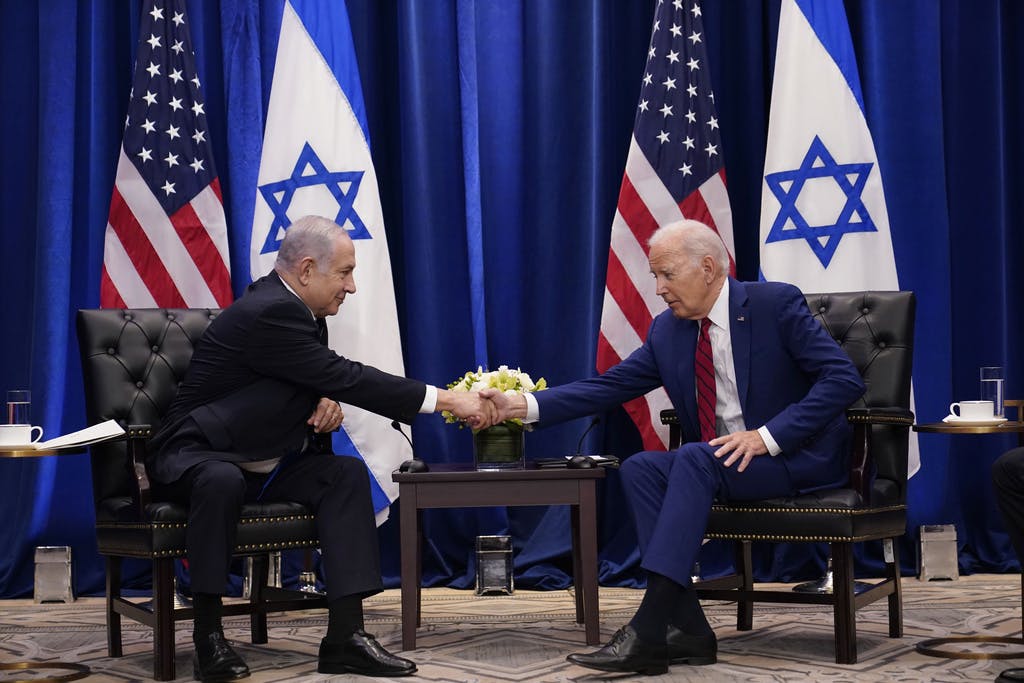Tensions on Display as Frenemies Biden and Netanyahu Hold Long-Awaited Meeting
One point of rare agreement between the American president and his Israeli guest is their enthusiasm for the prospect of a Saudi-Israeli rapprochement.

Following months of President Biden pointedly denied offering facetime to Prime Minister Netanyahu of Israel, the famous frenemies finally met Wednesday. At this point, even their well-scripted warm words could hardly hide their underlined distaste for each other.
Dodging the noisy Israeli protesters who have shadowed his American trip all week, Mr. Netanyahu arrived at Mr. Biden’s Midtown hotel in time for their scheduled 10 a.m. sit-down. The American president showed up a half-hour late, triggering comments about White House one-upmanship.
Before their hour-long one-on-one meeting, the veteran leaders addressed the press, armed with carefully chosen remarks meant to show their amity. Mr. Biden even attempted to dispel commentary that their meeting in the margin of the United Nations General Assembly was a poor substitute for a more ceremonial White House visit.
“Hello, my friend,” Mr. Biden said when he finally showed up. “Welcome, welcome, welcome, welcome, and I hope we’ll see each other in Washington by the end of the year.” In the same vein, Mr. Netanyahu said, “We’ve been friends for over 40 years,” at which point it was reported that Mr. Biden crossed himself.
The president then reminisced about his long admiration for the Jewish state: “Even where we have some differences, my commitment to Israel, as you know, is ironclad. I think without Israel, there’s not a Jew in the world that’s secure.”
Yet, those “differences” have been plaguing the relationship since even before Mr. Netanyahu recaptured the premiership last December.
“We’re going to discuss some of the hard issues,” Mr. Biden said. In a send-up to Mr. Netanyahu’s contested judicial reforms, the president named as one of those issues “upholding democratic values that lie at the heart of our partnership, including checks and balances in our systems.”
In another dig at Mr. Netanyahu’s hard-line coalition partners, the president called for “preserving the path to a negotiated two-state solution.” Yet another contentious issue was Mr. Biden’s vow to assure “that Iran never, never, acquires a nuclear weapon.”
On his end, Mr. Netanyahu called for a “credible military threat and crippling sanctions” against Iran, and to “support men and women that despise that regime.” America, in contrast, seems more interested in negotiations to renew diplomacy with the Tehran regime than in muscular action.
In a now-famous joint session of Congress, Mr. Netanyahu tried to stop the 2015 nuclear deal, known as the Joint Comprehensive Plan of Action, which turned the then-premier into a persona non grata with the Obama administration.
In another part of town on Wednesday, two publications, Al-Monitor and Semafor, held a day-long conference with Mideast leaders. Foreign Minister Nader Albusaidi of Oman — where secret diplomatic negotiations between Iranian and American diplomats take place — expressed hope for completion of a deal.
“We are still hopeful that the JCPOA will come back, but it’s too early to tell,” Mr. Albusaidi said. “Most of the deal is already negotiated, just a few technical issues remain to get back.” American officials have long refrained from any talk of a negotiated deal, and are elusive even on the prospect of reaching “understandings” with the Iranians. Even Israeli opposition leaders oppose any deal with Iran.
One point of rare agreement Wednesday between the American president and his Israeli guest was their enthusiasm for the prospect of a Saudi-Israeli rapprochement. Expressing confidence in Mr. Biden’s power to help move along a peace treaty, Mr. Netanyahu said it would also “advance peace between Israel and Palestinians.”
Mr. Biden highlighted a promise of a rail and ship corridor that would connect Europe to India and the rest of Asia through the Mideast. The two leaders “discussed how the project can benefit the entire Middle East region with investment and new forms of collaboration across two continents,” the White House said in a readout of the meeting. It would “make Israel a very important hub on a highway of unprecedented prosperity,” Mr. Netanyahu told reporters.
Yet, the longest passage in the White House post-meeting readout was about “ongoing tension and violence in the West Bank.” Mr. Biden, it said, “emphasized the need to take immediate measures to improve the security and economic situation, maintain the viability of a two-state solution, and promote a just and lasting peace between Israelis and Palestinians.”
That is a clear signal to Mr. Netanyahu of Washington’s disapproval of the members of Mr. Netanyahu’s coalition who oppose the establishment of a Palestinian state. As Mr. Netanyahu returned to his hotel, the chorus of Israeli protesters, now emboldened by Mr. Biden’s talk of “democratic values” and “checks and balances,” greeted the premier once again.

